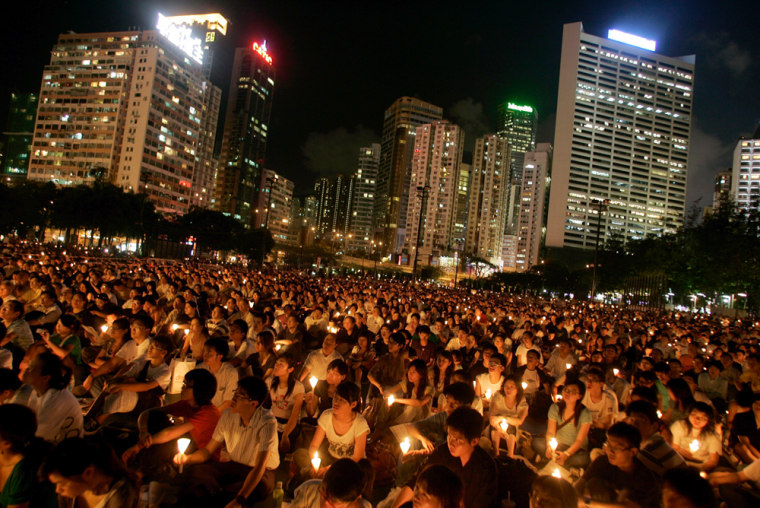HONG KONG — For a couple of days around this time every year, thousands of Hong Kong residents demonstrate for more democracy in the territory and in China, and for Beijing to come clean on the Tiananmen massacre of 1989.
The rest of the year, such calls take a back seat to commerce with mainland China, the world's fastest-growing economy.
But the city of seven million people that Britain handed back to China a decade ago remains a hive of dissent. Along with its neighbor, the former Portuguese-run enclave of Macau, it is one of two places under Chinese rule allowed such freedoms.
A handful of well-known Chinese dissidents call Hong Kong home, several magazines writing on a range of politically taboo topics in China are published here, and the Falun Gong spiritual movement, which is banned on the mainland, thrives.
Hong Kong enjoys a high degree of autonomy from the mainland but there are murky lines that cannot be crossed, and the highest-profile exiled Chinese dissidents are denied entry.
Among the few high-profile Chinese dissidents living in the city are labor activist Han Dongfang, a major player in the Tiananmen pro-democracy demonstrations, and human rights activist Frank Lu, also a 1989 veteran.
"If I had been living abroad for the last 14 to 15 years and I tried to enter Hong Kong now, I don't think I would be allowed in," Han said.
Han was jailed for nearly two years after the Tiananmen crackdown in which hundreds, perhaps thousands, were killed, and he contracted tuberculosis. Issued a visa to get treatment in the United States upon release, he was banished to Hong Kong in 1993 after being forcibly expelled from China upon his return.
"There's really no other comparable case," Han said.
Case by case
Many high-profile, exiled Chinese dissidents live in the United States, where they take up posts or study at universities.
It is widely known that veteran dissident Wei Jingshang has been barred entry to Hong Kong.
Wang Dan, a leader of the Tiananmen protests who spent 6-1/2 years in prison, was told his presence in Hong Kong would hurt the territory's "interests" when he applied to make a visit.
Wang said such refusals and other kinds of censorship are likely to continue as Hong Kong residents weigh the possible economic costs of criticizing China's leaders.
"Take freedom of speech for example," said Wang. "The newspapers in Hong Kong could lose much commercial coverage. In the 10 years since the handover, pressures like this have notably increased."
But in the run-up to the Beijing Olympics next year, China's leaders appear to be easing restrictions and allowing some dissidents into Hong Kong on a one-off, case-by-case basis.
In April, Chen Ziming, an academic branded a mastermind of the 1989 protests and sentenced to 13 years in prison, was allowed to do research at the Chinese University of Hong Kong.
Ren Wanding, another Tiananmen-era dissident jailed for 11 years, was allowed to visit for seven days for health checks.
Some analysts said the central government gave its blessing to the trips because no untoward incident has been reported in China since the 2005 death of Zhao Ziyang, who was toppled as Communist Party chief for opposing the Tiananmen crackdown.
Small but persistent
The dissident community in Hong Kong is small but vocal and some say its messages seep into parts of southern China, where Hong Kong TV signals can be picked up.
Ultimately, though, some activists see political change in China as a struggle to be won on the mainland.
"China's democracy must be fought for by its own 1.3 billion people," said Szeto Wah, former lawmaker and now chairman of The Hong Kong Alliance in Support of Patriotic Democratic Movements in China, which organizes Hong Kong's June 4 Tiananmen protests.
"I always say that wagging a dog's tail won't move the dog. China's population is 200 times larger than Hong Kong so how can we hope to influence China's overall situation?"
But Hong Kong people are not afraid to speak up when they feel Beijing's influence in the city's affairs is overbearing.
In July 2003, hundreds of thousands turned out to protest against state security laws geared to punish subversion: lawmakers subsequently shelved the legislation.
On June 4 this year, 27,000 people by a police count turned up for a candlelight vigil, spurred by the comments of a pro-Beijing lawmaker who said that what happened in 1989 "wasn't a massacre".
Huge turnout
That huge turnout came despite the hazy status of dissidents in the territory, a status Han Dongfang is comfortable with.
"A lot of friends told me to leave Hong Kong in 1997," Han said. "But I thought, the worse-case scenario would be that I would be sent to prison, and a Hong Kong prison is much better than a prison in China, so I decided I could live with it."
U.S.-based Wang Dan, studying for a Ph.D. at Harvard, will try again in hopes of one day teaching at a local university.
"I will keep trying," Wang said. "For this would be a test of the Chinese Communist Party's sincerity to realize its one country-two political systems promise." (Additional reporting by James Pomfret)
